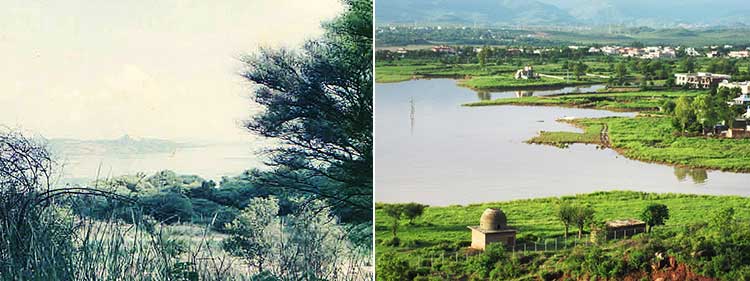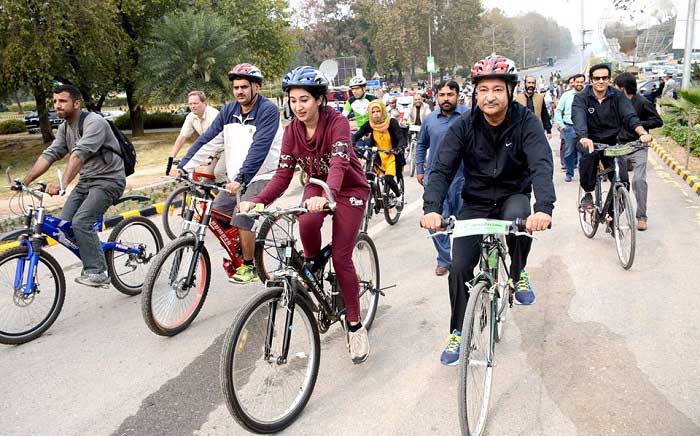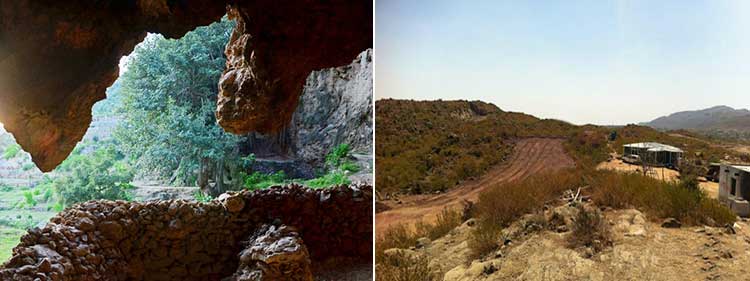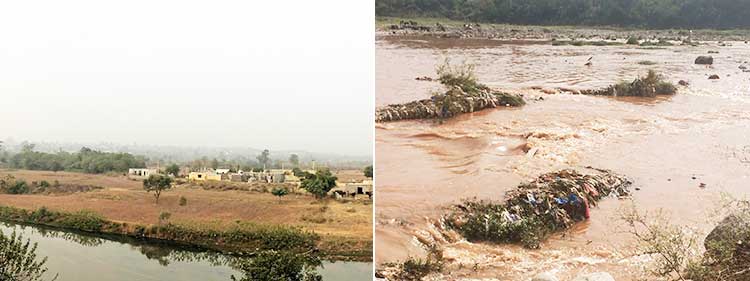Written by: Dr. Dushka H. Saiyid
Posted on: January 25, 2017 | 
(R-L) Chinese Ambassador H.E Sun Weidong, Finance Minister Ishaq Dar and Mayor of Islamabad Sheikh Anser Aziz at the launching ceremony of solar power plant at F-9 Park, Islamabad
Islamabad, the city of broad, leafy boulevards whose Margalla Hills National Park (MHNP) covers almost 174 kilometers, was an idyllic city of natural beauty. Pakistan’s first planned city was founded in the 60s, and became Pakistan’s capital in August 1967. There were no high-rises; every sector had its markaz or central shopping area, with each sub-sector equipped likewise with its mini-market. The city might not have had nightlife, but it was a haven for hikers and walkers with winding trails going up the Margalla Hills, while the area surrounding the Rawal Lake was a bird watcher’s paradise.
First came the land grab in Bani Gala, which was part of the Margalla Hills National Park, the catchment area for the Rawal Lake, and source of water for the residents of Rawalpindi. Dr A.Q Khan opened the floodgates of illegal construction there, and the courts gave them a legal cover in 1999. Thus began the pollution of the Rawal Lake, and the MHNP lost a large chunk of its Park to Islamabad’s rapacious elite.

As Islamabad’s population rocketed to over 1.4 million, its real estate turned to gold, and the CDA with its outdated systems and an unsavoury reputation for graft was unable to cope. The city’s infrastructure and services deteriorated, while encroachments and illegal construction diminished its green belts. CDA took responsibility only for the developed sectors, while the area of Islamabad Capital Territory was allowed to grow in a haphazard and chaotic manner, as the CDA kept issuing No Objection Certificates without any planning.
Hope has come with the introduction of local government and the election of Sheikh Anser Aziz as the Mayor in February 2016. However, since the well-entrenched bureaucracy of the Capital Development Authority (CDA) was checkmating the Mayor’s every move to improve the city’s governance, the Prime Minister very wisely also gave him the charge of Chairman CDA in September 2016.

In just over four months the Mayor has taken important steps to improve the city’s governance and make it environmentally friendly: the F9 park has gone solar with the help of the Chinese, and is also being provided with cycle tracks; after years of neglect, all roads and lights are being repaired; the garbage disposal system has been improved, while the green belts and parks are being cleaned (the practice of dumping sand and gravel in the green belts has been stopped); guards have been posted on trails and in the Hills to ensure that there is no illegal felling of trees, or littering of trails; funds have already been released for the protection of the archaeologically precious Shah Allah Ditta caves that date back to the 8th century. With parking becoming impossible in all commercial areas, the Mayor is ensuring that each plaza should have its own inbuilt parking, a rule that existed on paper but was never implemented by the CDA. Multi-tiered garages are being built in some of the markaz, and will go some way in easing the parking problem.

Long-term plans include a mass transit system, which is desperately needed given the increasingly snarled traffic in the city. The UNDP has funded a feasibility study for it. The Mayor has initiated an “Own a Park Scheme”, that the private sector can partner as part of their Corporate Social Responsibility, and this should help take some budgetary pressure off CDA. Enforcing its fiat over encroachers and illegal construction has been an uphill task because the CDA does not have enough manpower. The Prime Minister has been asked for the provision of a municipal police, or for dedicating a section of the police only to enforcement. The creation of the Islamabad Building Authority has been initiated, into which will be merged both the Islamabad Metropolitan Corporation and the CDA. This body will be able to control the sprouting of illegal housing in places like Shah Allah Ditta, and by the banks of the Korang River, which feeds the Rawal Lake.

Islamabad was hit by water shortages due to the late arrival of winter rains in the Pothwar region. As the supply of water became the Mayor’s priority, he discovered that the water supply department had no funding. With not enough water in either the Khanpur or Simly dams, CDA scrambled to fix leakages from pipes, and clean the water filtration plants that had not been done for years. The use of hosepipes was banned and a penalty of Rs. 5000 was imposed if the order was flouted.
When Sheikh Ansar signed the Green Charter of the UN Urban Environmental Accords in October 2016, Islamabad became the first city of Pakistan to do so. The challenge is to implement these accords and reverse the steady degradation of Islamabad’s environment that has taken place over the years. The Margalla Hills National Park are the lungs of the city and consists of three parts: Bani Gala, which has been converted into a housing development; Shakarparian, which is being rapidly deforested by mindless construction, including miles of forest sacrificed for the creation of a parade ground; the Margalla Hills is under siege of developers and heavy vehicular traffic, leading to the death of its flora and fauna. Some long-term planning is needed to substitute plastic bags for biodegradable ones, as they have become an increasing threat to our environment. France has taken the bold step to ban the use of all plastic utensils, unless made of biologically sourced material.
The Mayor of Islamabad is not just well intentioned but dynamic, and striving hard to create an environmentally friendly city. He needs all the support he can get to realize his dream.
You may also like: